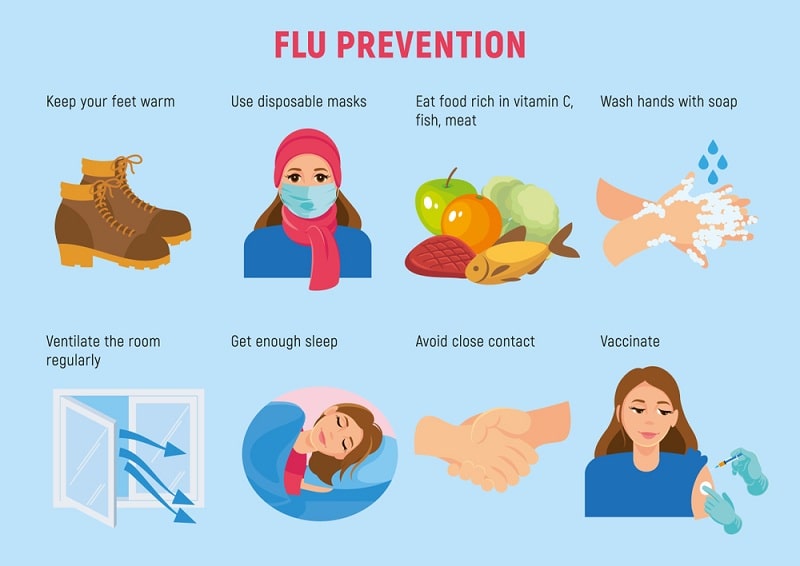The flue (influenza) is a typical infectious illness that is viral. Flu is usually mistaken for frequent colds as a result of similar symptoms. On the other hand, the virus that causes influenza differs from that of colds, and flu will be more severe than the latter. Very severe cases can be life-threatening.
What causes the flu?
Folks usually catch it via these means:
By breathing in miniature virus-containing droplets in the cough or sneeze of someone who has the flu
By coming in direct contact with the secretions of an infected individual, such as by kissing, touching, or sharing food utensils
The virus can also be transferred absorbed by one among the nose, eyes, or mouth area.
Flu viruses are classified as forms A, B, and C, using Type A classified into sub-types based upon the virus’s chemical structure (surface proteins). The kind of virus contracted could lead to varying signs, details of which can be explained soon.
Types A and B cause the most frequent types of infections and are liable for influenza epidemics and seasonal outbreaks of influenza. Form A viruses can happen in animals and humans, whereas type B influenza happens in humans alone.
Type C influenza isn’t as prevalent and is unrelated to seasonal flu. It usually causes mild respiratory ailments and is far less severe than other sorts.
Many men and women catch the flu more frequently than others. Additionally, flu outbreaks usually occur in the winter months as a result of ideal conditions for the virus to live and if individuals are mostly inside and at more constant contact with other individuals.
What are the symptoms of the flu (influenza)?
Flu symptoms start from one to seven days after coming in contact with the influenza virus. Along with the fever, most frequent symptoms include the following:
- Lack of energy
- Lack of appetite
- Headache
- Dizziness and nausea
After a couple of days, the entire body pains and fever usually deteriorate. But, new symptoms start to happen, which may comprise:
- Sneezing
- Nasal congestion
- Heavy breathing
It usually takes about seven days to get all symptoms to go away fully. For many folks, the cough and the sensation of fatigue may persist for months. For other people, breathing problems such as asthma and other chronic ailments are made worse with influenza.
It’s essential to notice that the difference between influenza and cold symptoms. Frequent cold is also viral, however, is generally milder in symptoms and goes away after a couple of days. Flu, nevertheless, makes you unwell and exhausted for a very long period. Influenza can also complicate into severe health issues such as pneumonia and may sometimes necessitate hospitalization.
An influenza patient is contagious out of a day earlier to up to seven days after the initial symptoms detected, even after many symptoms have subsided.
The influenza treatment
If you are entirely healthy, and you are having flu-like symptoms or assume that you have the flu, then there’s usually no requirement to find a physician. It’s ideal to stay in to break, keep warm and hydrated. Over-the-counter medications such as paracetamol or aspirin can do the job nicely in reducing the high temperature, relieve body aches, and control other ailments.
But higher risk patients and young kids experiencing flu symptoms must see their general practitioner as soon as you can for suitable guidance and medical advice. This is because the influenza virus can have more significant impacts for you, and your health care provider can prescribe an appropriate anti-viral medication. You are considered insecure for those who:
- Have a chronic medical illness such as heart disease, kidney, autoimmune or neurological
- disease or diabetes
- are aged 65 or over
- are pregnant
Have compromised immune system because of hereditary factors
Anti-viral medications can stop considerable influenza symptoms and shorten its duration; however, only if taken immediately as soon as the symptoms start. Anti-bacterial medications, on the other hand, are not suggested for influenza as it isn’t bacterial.
- Issue in breathing
- Blue or purple discoloration of your lips
- Unusual, uncontrollable itching
- Confusion in everyday matters
- Unconsciousness
- Appearance of rashes
- Intense nausea
- a body temperature of greater than 40 ºC (105 ºF)
- Seizures
- Pain in the abdomen or chest
How to prevent the flu?

Since influenza is viral, one can block it by strengthening the immune system using a balanced diet, adequate exercise, and sufficient sleep or rest. It also will help to avoid unnecessary contact with individuals with influenza.
Additionally, the flu vaccine is also available today in the kind of shot or nasal spray in children. The flu vaccine is advisable for all and is also strongly recommended for people that are at a higher risk for complications (as explained above). The flu vaccine can operate against Types A and B influenza viruses.

